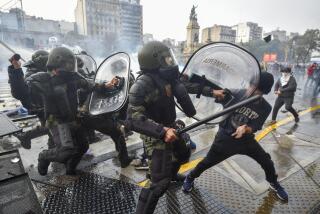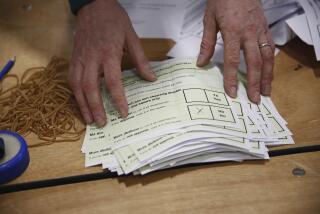Few Egyptians vote on amendments
- Share via
CAIRO — Amid anemic turnout, Egyptians voted Monday on a package of constitutional amendments in a referendum boycotted by opposition groups and criticized by human rights organizations and the U.S. government.
Despite a push by President Hosni Mubarak’s ruling National Democratic Party to get out the vote, polling stations throughout Cairo saw only a trickle of voters -- many of them party members or civil servants bused in from work.
Government officials estimated turnout of registered voters at 25%; the Egyptian Organization for Human Rights put it at 4%.
“It can’t even be called minimal participation,” said Ghada Shahbandar, a member of the independent monitoring group Shayfeen.com. “The people of Egypt did not show up for this referendum.”
The amendment package, approved March 19 by the NDP-dominated parliament, would remove independent judicial supervision of elections and grant Mubarak the right to dissolve parliament. It also would make permanent the emergency laws that have allowed government security agents to tap phones, monitor mail and enter the homes of citizens judged to be terrorism threats.
The entire package will pass or fail by simple majority, regardless of turnout.
At the Khedive Ismail school in Cairo’s Sayeda Zeinab neighborhood, a slow stream of voters wandered into the converted schoolrooms, each placing a ballot into a locked glass and wood box behind a blue curtain.
“We are here because it is our national duty,” said Nabila Abdel Kader, 58, who said she favored most of the amendments.
Others were less emphatic.
“I don’t even know what they amended,” said an employee of the federal tax authority after emerging from a polling station near the authority’s downtown offices. Asked why she came to vote, she laughed. “My boss told me to.” She declined to give her name.
Gamal Mubarak, a senior party official and the president’s son, called the measures “a very important milestone in our reform process.” But he added: “Democracy is an evolving process.... We still have a ways to go.”
The amendments have been panned by domestic opposition forces and international human rights groups.
Criticism has been muted from the Bush administration, which considers Mubarak an ally.
Before Secretary of State Condoleezza Rice left Washington on Friday for a Middle East tour, she described the amendments as “disappointing,” a remark that drew a rebuke from the Egyptian government as meddling in domestic affairs. After meeting Sunday with President Mubarak, Rice offered milder comments.
“The process of reform is one that is difficult,” she told reporters. “It’s going to have its ups and downs.”
Human Rights Watch said the constitutional changes “effectively remove basic protections against violations of Egyptians’ rights to privacy, individual freedom, security of person and home, and due process.”
Monday’s vote, critics say, will turn Egypt’s de facto state of martial law into permanent policy.
Wiretapping and extrajudicial arrests have been standard practice under the emergency laws, imposed in 1981 after the assassination of Mubarak’s predecessor, Anwar Sadat. In 2005, in the nation’s first open presidential election, Mubarak’s successful campaign included a promise to repeal the emergency laws.
“These basic freedoms have already been waived long ago,” said Elijah Zarwan, a Cairo-based researcher with Human Rights Watch. “This makes Egypt a constitutional police state.”
Perhaps the most controversial amendment would replace direct judicial supervision of polling stations with a vaguely defined “higher committee which enjoys independence and impartiality.”
Egypt’s judges, who retain some independence, personally monitored every polling place for the first time during parliamentary elections in 2000. In the 2005 balloting, their presence was credited with uncovering multiple instances of government vote tampering and with leveling the playing field to allow victories by candidates associated with the Muslim Brotherhood, an Islamist opposition movement. Two judges were later disciplined for publicly alleging vote fraud.
Opponents say the amendment would give Mubarak the permanent ability to control future elections.
“The ballot box is the most important element in the elections, and we have lost control over it,” said Mahmoud Khodeiri, a vice president of the Court of Cassation, Egypt’s highest appellate court. “The monitoring will be in the hands of the executive branch.”
The ultimate legacy of Monday’s vote may be the final curtain on the so-called Cairo Spring of activism.
In 2005, a suddenly energized leftist movement bypassed the country’s official opposition parties and publicly challenged the government. Rallying around the slogan “Kifaya!” -- “Enough!” -- the secularist movement captured the imagination of the local and international media and made tentative steps toward an alliance with the powerful Muslim Brotherhood.
That movement has been demoralized and diminished by steady government repression and a failure to broadly connect with the Egyptian people. On Monday, fewer than 100 protesters gathered on the steps of the Journalists Syndicate shouting anti-government slogans with riot police surrounding the building.
The Muslim Brotherhood boycotted Monday’s vote and refrained from large protests. Its absence left the secularist opposition in a familiar position: isolated, outnumbered and off the public’s radar.
Brotherhood spokesman Essam Erian said a large Brotherhood show of force would have prompted a crackdown.
“There may have been tanks in the streets,” he said.
The Brotherhood stands to lose a great deal with the amendments, one of which would ban religiously based political parties. Like the anti-terrorism guidelines, the ban would formalize long-standing policy. Its enshrinement in the constitution would in effect end the Brotherhood’s hopes of entering Egypt’s political arena.
Erian said the group was considering pulling its 88 members -- the largest opposition bloc -- out of parliament.
“The only solution now is to boycott all political life,” Erian said.
“Let them play alone.”
*
Times special correspondent Noha el Hennawy contributed to this report.
More to Read
Sign up for Essential California
The most important California stories and recommendations in your inbox every morning.
You may occasionally receive promotional content from the Los Angeles Times.













